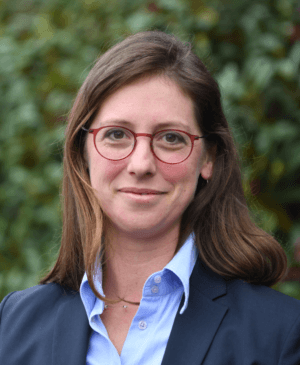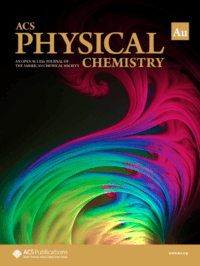Learn more about Professor Gemma Solomon, the journal’s Deputy Editor, and how she found her "happy place" at the intersection of chemistry and physics.


ACS Physical Chemistry Au launched in January 2021. This broad-scope, open access journal provides physical chemists and chemical physicists with a high-quality outlet for their research if they want to publish open access or if their funder requires them to do so.
Professor Gemma Solomon from The University of Copenhagen is the journal’s Deputy Editor. In this interview, she reveals more about herself, offers her top tips for developing a research career, and shares what her superpower would be.
So, Gemma – what drew you to physical chemistry?
I took a roundabout path to physical chemistry. I entered university intending to be a lawyer, but at that time, I could only study law as an undergraduate if I combined it with another degree – I chose science. Starting my undergraduate studies, I liked chemistry, but I loved physics. Slowly I found out that I really thrive at the intersection between chemistry and physics and left law behind without any regrets. Many of the other groups that do similar research to mine are in physics departments. While we use the same methods, we are solidly on the chemistry side, with a focus on how to achieve chemical control over physical observables.
In recent years, my work as a Senior Editor at The Journal of Physical Chemistry A/B/C has broadened my physical chemistry interests significantly. JPC receives such a broad range of papers and, even though I primarily cover theory and topics related to my own research, I still see a much wider range of papers than I would read for my own research and teaching. It’s been a great opportunity to get a sense of all the activity and exciting developments in neighboring fields.
What were the biggest challenges for you in developing a research career?
The biggest challenge for me has been (and continues to be) navigating what a scientific, academic career looks like as part of a family with young children and two working parents. The stereotype of the driven academic, working long hours, traveling to conferences, visiting collaborators for extended periods, and putting the pursuit of great science above all else doesn’t fit so well with my current circumstances. I know I’m certainly not the first person to have to navigate these challenges, but I had not appreciated all the dimensions of the issue before I found myself in the middle of it. I am very fortunate to work in a very supportive department in a country where a great emphasis is placed on work-life balance, so I think the challenge for me is mostly in reevaluating the expectations I have for myself.
Do you have any tips for aspiring researchers to help them develop their careers?
Ask as many people as possible for career advice, and don’t take any of it too seriously! There are so many paths towards a successful career, and advice based on one’s own personal experience draws on a sample size of one. Each of us has to find our own way – you might just be the person to break the mold and find your way to success despite all the advice to take a different route.
For me, what worked was moving in the directions that made me feel courageous and always trying to play to my own strengths. Find the people that make you feel empowered and listen to them to gain courage, if nothing else.
What does open science mean for you as a researcher?
The more I have thought about open science, the more enthusiasm I have for the whole package: open access, open data, open methods, open source – you name it! I had always appreciated the idea that making all our work available was going to aid others in their research and potentially increase the impact of our work. These days, however, I am also motivated by selfish considerations. The institutional memory in a research group can be very short as students and postdocs move on after a few short years, and this can significantly impact the ability for us to reproduce our own work 10 years down the track. Now I see that my own research group might be the biggest future users of our own code, data, etc. Future students can more efficiently build on our prior work when we have taken the time to properly document and make our research open. Of course, internal use doesn’t require things to be open, but practically I find that we do a better job of archiving our output in a way that we can re-use when we have been thinking of an external user.
As the Deputy Editor of ACS Physical Chemistry Au, what are you looking for in a paper?
We’re really excited about papers focusing on physical insight across all of physical chemistry. We welcome articles, reviews, perspectives, and letters either presenting new research or providing an overview of important developments in the field.
Our name and editors will undoubtedly mean that authors draw parallels with The Journal of Physical Chemistry, but as one of the nine ACS Au journals that span the full range of hybrid journals in the ACS portfolio, we hope that people will appreciate that our scope is broader.
As part of our focus on physical chemistry, we also hope to champion open science and are very interested in submissions from authors who are supporting these efforts. We would be very happy to hear from researchers developing repositories to address the challenges for open data in physical chemistry, open-source software, and documenting open methods.
Finally, if we could grant you one superpower: what would it be, and why?
To fly. My biggest disappointment in moving out of childhood is that I stopped having flying dreams – they were always the best. Just like swimming breaststroke, but somehow there was just enough resistance in the air. I don’t imagine I would use this superpower for anything useful, but it would be joyful.
ACS Physical Chemistry Au is ready to receive your research. It will be subject to the same robust, fair, and efficient peer review of all ACS journals to ensure it promotes science that truly progresses physical chemistry and chemical physics. And open access brings the main benefit that all interested readers have instant access, meaning your work can make more of an impact, quicker.
